
Fast, affordable Internet access for all.

Golden, Colorado has struck a new right-of-way agreement with Google Fiber that should expedite the competitive delivery of affordable fiber to the city of 20,000.
The deal gives Google Fiber non-exclusive access to public right-of-way to build a commercial broadband network, though it delivers no guarantee of uniform access across the entire city.
In a memo to the Golden City Council, Chief Innovation and Technology Officer Jiles McCoy said the city’s new agreement “would act as a template for any future companies wishing to build broadband services in the Golden right of way.”
The move comes after years of discussion in the city as to how to improve local broadband competition, reduce prices, and expand affordable access.
In 2016, Golden residents voted to opt out of a now defunct state law, ghost written by regional broadband monopolies, restricting the construction and operation of community owned and operated broadband networks. Last year Colorado leaders finally eliminated the law completely, opening the door to greater expansion of community-owned networks.
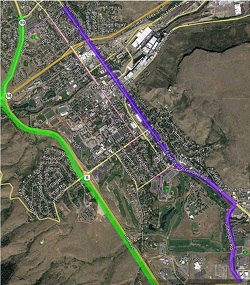
In 2019 the city completed a feasibility study showing that the construction of a full city-owned fiber network would cost $37 million. Instead of tackling the entire project at once, advisers recommended the city proceed in phases, beginning with the construction of a $3.8 million, 10.5 mile fiber ring connecting key community anchor institutions.
Eagle, Idaho is preparing to connect the first of the city’s 32,000 residents to a new, municipally-owned open access fiber network. The project, which the city says will take between five to 10 years to complete, is being heavily funded by federal grants, and aims to meaningfully boost broadband competition – and affordable access – citywide.
ISLR profiled Eagle’s efforts last year, noting that the $5 million initial downtown fiber loop was jump-started with the help of the city’s $6.7 million allotment of American Rescue Plan Act (ARPA) funding.
Roughly 300 homes and 30 businesses should be able to connect to the network within the next six months, the city now says. More than 30 residential subdivisions are in the early deployment phase, and the project will expand steadily over the next decade, funded by revenues from existing subscribers and future state and federal grant opportunities.
Like countless American communities, Eagle suffers from a notable lack of competition between regional phone giant Lumen (formerly Centurylink, now operating under the Quantum brand), and regional cable company CableOne (under the Sparklight brand). That muted competition results in high prices, spotty access, slow speeds, and substandard customer service.
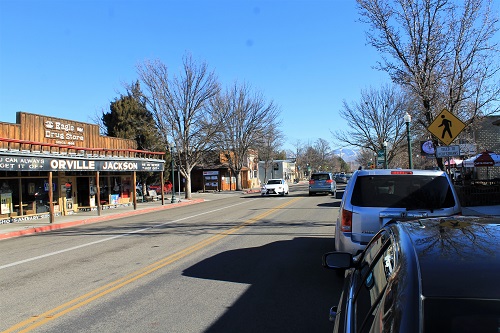
Enter Eagle’s open access fiber network, which will allow numerous ISPs to compete in layers, driving down market entry costs for providers and broadband access prices for consumers. City leaders say the aim is to offer symmetrical gig speed service for between $50 and $60 to residents, and $150 per month to local businesses.
Waterloo, Iowa’s municipal broadband project has taken a major step forward after nearly two decades of planning.
Waterloo Fiber officials just launched their first limited fiber trial, will connect their first commercial customers in February, and are on target to deploy affordable fiber at speeds up to 10 gigabit per second (Gbps) to every last city resident by 2026.
When we last checked in with Waterloo in February of last year, the city was putting the finishing touches on a plan to spend $115 million to build a fiber backbone accessible to all 67,695 Waterloo residents, after locals approved the city issuing general obligation bonds to fund the start of the three-phase construction project.
Construction of the network began last summer at a groundbreaking ceremony hosted by Waterloo Mayor Quentin Hart.
“It will be the lifeline that connects our entire community, enabling businesses to thrive, students to excel and families to stay connected," Hart told attendees. "This fiber system will lay the foundation for a smart city innovation, economic growth and an enhanced quality of life for all our residents."
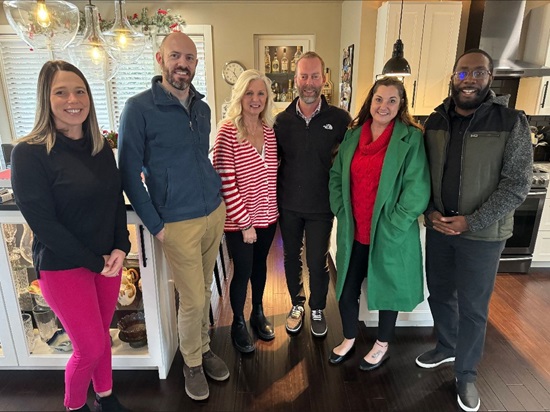
Last month the city connected the first of four participants in a limited pilot project.
UTOPIA Fiber has completed its fourth major broadband deployment of 2023, with the finished construction of a $23.5 million citywide fiber-to-the-home (FTTH) build in Syracuse, Utah (est. pop. 33,000).
Network construction began November 30, 2021, and its first customer was connected on September 12, 2023. UTOPIA officials say the new Syracuse network passes 12,324 residential addresses, and has already reached a nearly 16% subscriber take rate in the city.
UTOPIA, shorthand for Utah Telecommunication Open Infrastructure Agency, is a collaboration between 11 Utah cities that joined together in 2004 to build, deploy and operate a fiber network that reaches every last home and business in its territory. Since 2009, UTOPIA’s expansion has been funded entirely by subscriber revenues.
Despite some early lawsuits by regional monopolies like Qwest (now Centurylink/Lumen) designed to kill the project before it could get a foothold, UTOPIA has not only survived but thrived, and its success has been transformative for large swaths of the Beehive State.
Syracuse – like many U.S. communities – had been consistently underserved by a duopoly of Comcast and Centurylink (Lumen). That lack of competition consistently results in sluggish, expensive, spotty broadband service, and substandard customer service. Now, locals have access to a variety of far more affordable options thanks to a menu of UTOPIA partner ISPs.
Blue River, Colorado (est. pop. 882) is the latest Colorado municipality to explore building its own broadband network with an eye on affordable access. The town is part of a trend that’s only accelerated since the state eliminated industry-backed state level protections restricting community-owned broadband networks.
Just south of Breckenridge in the central part of the state, Blue River is nestled in one of the more rural parts of Summit County. Comcast (Xfinity) enjoys a broadband monopoly, resulting in spotty access, slow speeds, and high prices. Locals also routinely complain that cell phone service remains spotty in much of the mountainous area.
In response, town leaders recently hired the consulting firm, NEO Connect, to explore the possibility of building a town-wide fiber network. According to a feasibility study presented to the Blue River Board of Trustees by Mayor Toby Babich, the construction of a fiber network serving every town resident will cost somewhere in the neighborhood of $13 million.
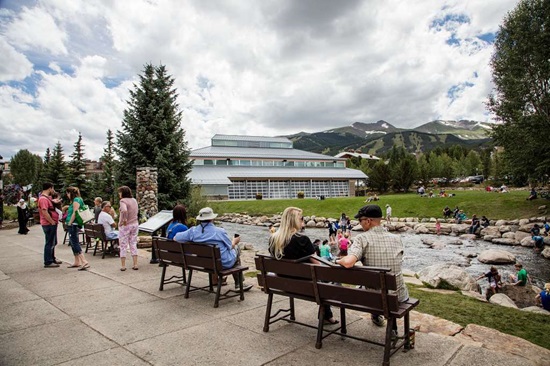
While that “may seem out of reach,” Babich recently told the board, “we believe with the right funding and partnership we can move forward with this project.”
The estimates for network construction range somewhere between $7 million to $24 million, depending on how much underground trenching work is required.

A little more than three years ago, the city of West Des Moines, Iowa announced that it would build a citywide open access conduit system to lower the cost of new broadband deployment to facilitate better connections at lower costs for residents. GFiber (formerly Google Fiber), Mediacom, Lumen (formerly CenturyLink), and local ISP Mi-Fiber have since signed on as providers.
This week on the podcast, Deputy City Manager Jamie Letzring and city Innovations Consultant Dave Lyons join Christopher to talk about overcoming design and legal challenges of building an infrastructure system that remains relatively unique, and the commitment the city has made to reach economically disadvantaged households to make sure everyone has a quality and affordable connection. Finally, they share a little about how the city has been taking steps to use the new conduit system to supplement its already-robust fiber network for government facilities, smart-city initiatives, and more.
This show is 36 minutes long and can be played on this page or via Apple Podcasts or the tool of your choice using this feed.
Transcript below.
We want your feedback and suggestions for the show-please e-mail us or leave a comment below.
Listen to other episodes here or view all episodes in our index. See other podcasts from the Institute for Local Self-Reliance here.
Thanks to Arne Huseby for the music. The song is Warm Duck Shuffle and is licensed under a Creative Commons Attribution (3.0) license.
Berthoud, Colorado, population 11,717, is the latest Colorado community to explore community broadband alternatives to expand public access to affordable fiber. Currently in the process of crafting a request for quote (RFQ), the city tells ILSR it hopes to make its final determination by November and have a preliminary plan in place by the end of the year.
Originally, Berthoud had planned on forming a coalition with three neighboring Colorado towns (Johnstown, Mead and Milliken) in a bid to expand access. That plan involved striking a memorandum of understanding (MOU) with Lincoln, Nebraska based Allo Communications, to deliver fiber to every address within three years.
But city leaders say the original plan wasn’t meant to be.
“The four communities did not strike a deal with Allo,” Berthoud Business Development Manager Walt Elish told ILSR. “We could not come to terms. Since then, we have looked at other options, including a town-owned network.”
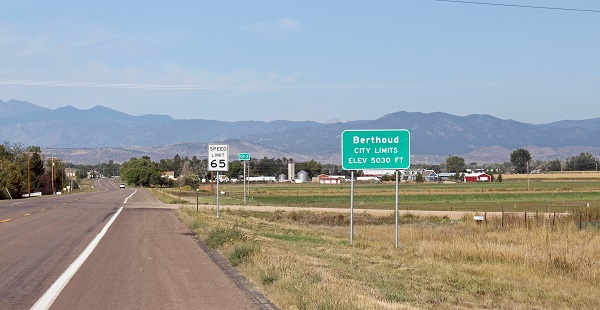
As with many towns and counties, the high cost of a municipally owned broadband network has the city examining different options, including a potential public private partnership (PPP) with existing providers. PPPs are increasingly common but can have their downsides, including less municipal control over pricing or the potential trajectory of the finished network.
Decorah, Iowa is moving forward on a long-percolating plan to expand the city’s core fiber ring to provide affordable broadband access to long-neglected residents and businesses.
While the project has been discussed for years, local officials tell ISLR the project gained renewed momentum during peak COVID, and is creeping closer to launch.
Contracts are still being finalized as the city hopes to spend somewhere around $12 to $15 million to deliver fiber to all 3,000 potential subscriber locations. The full project would take about three years to deliver fiber to all 7,740 city residents, with the first subscribers potentially coming online this fall.
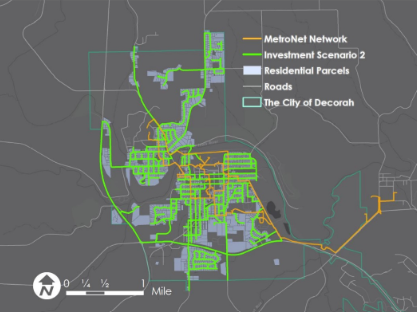
“Decorah has been in pursuit of fiber to the premises for the last 8 to 9 plus years and we finally have broken through some of our challenges on how to get to the finish line,” Chopper Albert, Decorah IT Director told ISLR.
According to Albert, Decorah’s recent progress is thanks in part to new City Manager Travis Goedken, who has long advocated for expanding the city’s existing fiber network to drive affordable fiber access citywide.
New City Management Team Pushes Forward
Since 2013 the city has owned an 11-mile core fiber network, dubbed the Decorah MetroNet. MetroNet was born out of frustration after a major flood in 2008 across much of Iowa resulted in prolonged communications network outages.
MetroNet (not to be confused with the Indiana-based ISP that goes by the same name) currently provides access to Luther College and 18 additional government buildings and anchor institutions.
Portland activists are renewing their calls to prioritize the construction of a municipally owned broadband network in the Oregon city of 635,000. With an historic infusion of federal subsidies and a looming shakeup of city politics, advocates for community-owned broadband say the time is right to finally revolutionize city telecom infrastructure with an eye on affordability.
“Ten years ago was a perfect time to embrace community broadband and nothing has changed,” Russell Senior, President of Personal Telco, a nonprofit wireless network, and Municipal Broadband PDX, a nonprofit advocating for publicly-owned fiber networks in Multnomah County, Oregon told ILSR.
“ISPs continue to exercise monopoly power and have their boot on the neck of subscribers,” he said. “The most practical and effective way to get out from under that boot, in light of persistent federal complicity, is local public ownership of the infrastructure that gives them that power.”

Portland has historically been at the very center of the debate over monopoly power and competitive broadband access, and city officials have been contemplating a publicly-owned broadband network for more than 20 years. It’s a concept other Oregon cities, like nearby Hillsboro, adopted years earlier.
Superior, Wisconsin officials have given the green light to the first pilot area for Superior’s new city-owned fiber network. Dubbed Connect Superior, the open access fiber network aims to deliver affordable gigabit access to every resident, community anchor institution and business in the city of nearly 27,000.
On July 5, the Superior City Council voted 8-1 to approve deployment in the project’s first pilot area: a swath of around 821 homes and businesses lodged between Tower Avenue, Belknap Street, and North 21st streets. The vote lets the city now begin issuing RFPs for network construction and negotiate with potential network tenants.
In 2020 the city passed a resolution declaring fiber essential infrastructure. In 2021, the city council voted overwhelmingly to move forward on a deployment master plan developed for the city by EntryPoint Networks. The initial $2.26 million cost of the pilot will be paid for with the help of $5 million from the city’s $17 million allocation from the American Rescue Plan Act funding.
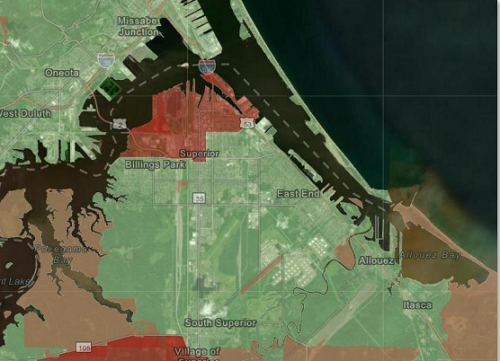
A citywide deployment, should the city pursue it, is expected to cost somewhere around $31 million. The city remains hopeful that much of the cost can be offset by what it hopes will be a 40 percent take rate among local residents and businesses.